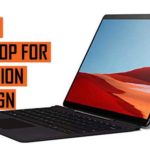This guide helps fashion designers choose a desktop PC that supports their artistic process, software needs, and daily creative demands.
If you sketch digitally, work with design software like Adobe Illustrator or CLO 3D, run mood boards, manage image libraries, or prepare digital lookbooks, then you’re in the right place for getting a machine that keeps up with your imagination.
Too often, designers buy a system that seems stylish or affordable, only to be slowed down by freezing software, delayed brush strokes, or overheating during video edits. We’ve helped countless creatives avoid these traps by steering them toward the specs that matter.
In fashion design, you’re using tools that rely on RAM for multitasking, GPU power for 3D rendering and fabric simulation, color-accurate displays for true-to-life palettes, and fast storage to manage high-res files. A weak setup affects your output, slows your projects, and pulls you away from design and into tech headaches.
That’s why we focus on systems that don’t simply meet minimum software requirements but support an uninterrupted, expressive, and technically confident workflow.
From concept sketches to final presentations, your desktop should feel like a creative partner, not a bottleneck.
We evaluate desktops based on six core criteria: CPU performance, RAM capacity and upgrade path, dedicated GPU power, color-accurate display compatibility, storage configuration, and port variety. All desktops recommended here include a multi-core CPU (Intel i5/Ryzen 5 or higher), a dedicated GPU (at least GTX 1660 or RTX 3050), 16GB RAM (minimum, with upgrade potential), a 1TB NVMe SSD, and color calibration support for external monitors.
CPU: Rendering patterns in 3D, exporting layered PSDs, or managing large AI files demand strong CPU power. We recommend a recent Intel Core i7 or AMD Ryzen 7 processor. These chips accelerate render times, reduce crashes during heavy software sessions, and help keep design iterations smooth. Lower-end CPUs limit your ability to open large projects or preview complex layouts.
RAM: Design software thrives on memory. You need 16GB as a starting point, with support to upgrade to 32GB or higher. This allows you to work across Photoshop, Illustrator, InDesign, CLO 3D, and your browser simultaneously. Insufficient RAM results in program freezes and long load times during saves and exports.
GPU: If your work includes 3D draping, fabric physics, motion visuals, or high-res texture manipulation, a dedicated GPU is essential. We look for NVIDIA RTX 3050, 3060, or AMD Radeon RX 7600. These cards speed up rendering, allow for real-time previews, and handle software like CLO 3D, Blender, and After Effects. Integrated graphics struggle under this load.
Display Support & Color Fidelity: Most fashion designers use external monitors, so your PC must support high-resolution, color-accurate displays with sRGB or AdobeRGB fidelity. HDMI 2.0, DisplayPort 1.4, and GPU calibration tools matter here. Accurate color helps you choose the right tones, manage textile swatches digitally, and ensure your brand aesthetic holds up across formats.
Storage: Large projects, visual assets, and software libraries require fast and spacious storage. We recommend a 512GB or 1TB NVMe SSD with support for additional drives. SSDs improve boot times, allow you to open files quickly, and reduce delays when saving or exporting. HDDs are useful only for long-term storage and archiving.
Ports and Connectivity: Your desktop should have USB 3.2, USB-C, HDMI, DisplayPort, Ethernet, and audio outputs. These allow you to connect drawing tablets, USB drives, printers, external displays, and calibration tools. Fashion design is tactile. you need ports ready for your tools.
These machines are built for power and reliability. They will support complex mood boards, manage multi-layer compositions, export in high-resolution formats, and handle 3D garment simulation. If you’re building your digital portfolio, working freelance, or designing runway collections in digital form, these systems give you the stability and power to focus on your design vision.
If you’re a fashion design student, a digital stylist, a textile artist, or a professional designer shifting to digital, these desktops offer the platform you need to work with precision, speed, and confidence.
Also check out the best desktop pcs for SketchUp
The Following are the Best 2026 Desktop Computers for Fashion Design:
Contents
- HP Victus Gaming Desktop, AMD Ryzen 7-5700G Processor, Radeon RX 6600XT 8GB Graphics(Outperforms RTX 3060), 32GB RAM, 2TB PCIe SSD
- Alienware Aurora R10 Gaming Desktop - AMD Ryzen 7 5800, 16GB DDR4 RAM, 1TB SSD, NVIDIA GeForce RTX 3080
- MSI Aegis ZS Gaming Desktop, AMD Ryzen 7 7700, GeForce RTX 4060, 16GB RAM, 1TB SSD
- ROG Strix GA15DH Gaming Desktop PC, AMD Ryzen 7 3800X, GeForce RTX 2070 SUPER, 16GB DDR4 RAM, 512GB PCIe SSD + 1TB HDD
- Skytech Gaming Azure Gaming PC Desktop – AMD Ryzen 7 7700X 4.5 GHz, NVIDIA RTX 4070, 1TB NVME SSD
- Skytech Gaming Nebula Gaming PC Desktop – Intel Core i5 13400F 2.5 GHz, NVIDIA RTX 4060, 1TB NVME SSD
HP Victus Gaming Desktop, AMD Ryzen 7-5700G Processor, Radeon RX 6600XT 8GB Graphics(Outperforms RTX 3060), 32GB RAM, 2TB PCIe SSD |
|
|---|---|
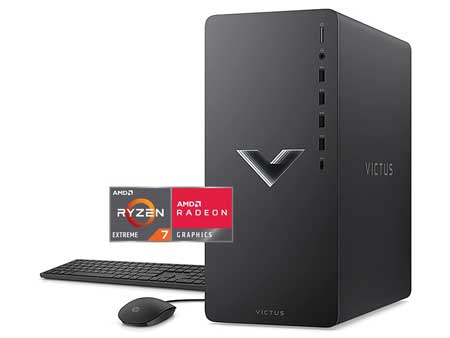 See This On Amazon |
|
| CPU | AMD Ryzen 7-5700G |
| Processor Speed | up to 4.6 GHz max boost clock, 16 MB L3 cache, 8 cores, 16 threads |
| GPU | Radeon RX 6600XT 8GB Graphics |
| Graphics Card Memory | 8GB |
| RAM | 32GB RAM |
| Storage Space | 2TB PCIe SSD |
| Operating System | Windows 11 |
| Dimensions | 19 x 15.5 x 12 inches |
| Keyboard & Mouse | Included |
| Computer Monitor | Sold Separately |
| Advantages | Good performance, Value for money |
| Disadvantages | None |
Alienware Aurora R10 Gaming Desktop - AMD Ryzen 7 5800, 16GB DDR4 RAM, 1TB SSD, NVIDIA GeForce RTX 3080 |
|
|---|---|
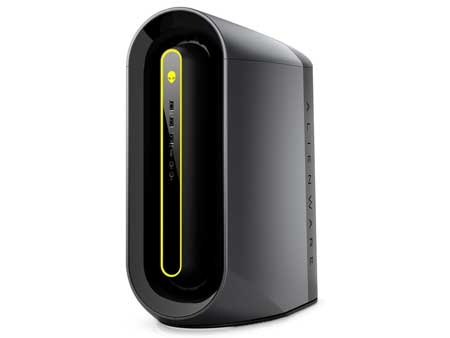 See This On Amazon |
|
| CPU | AMD Ryzen 7 5800 |
| Processor Speed | 4.6 GHz |
| GPU | RTX 3080 |
| Graphics Card Memory | 10 GB |
| RAM | 16GB DDR4 |
| Storage Space | 1TB SSD |
| Operating System | Windows 11 |
| Dimensions | 17 x 8.77 x 18.9 inches |
| Keyboard & Mouse | Sold Separately |
| Computer Monitor | Sold Separately |
| Advantages | Performance, Design |
| Disadvantages | None |
MSI Aegis ZS Gaming Desktop, AMD Ryzen 7 7700, GeForce RTX 4060, 16GB RAM, 1TB SSD |
|
|---|---|
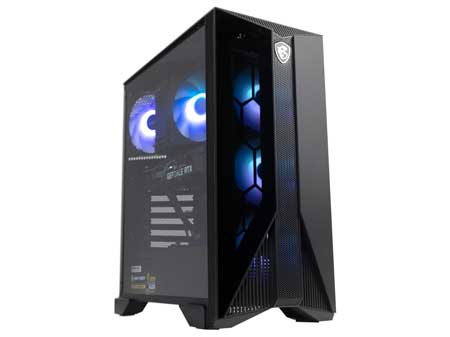 See This On Amazon |
|
| CPU | AMD Ryzen 7 7700 |
| Processor Speed | 3.8 GHz |
| GPU | GeForce RTX 4060 |
| Graphics Card Memory | 8 GB |
| RAM | 16GB |
| Storage Space | 1TB SSD |
| Operating System | Windows 11 |
| Dimensions | 24.4 x 22.7 x 12.1 inches |
| Keyboard & Mouse | Included |
| Computer Monitor | Sold Separately |
| Advantages | Performance, Price |
| Disadvantages | Storage |
ROG Strix GA15DH Gaming Desktop PC, AMD Ryzen 7 3800X, GeForce RTX 2070 SUPER, 16GB DDR4 RAM, 512GB PCIe SSD + 1TB HDD |
|
|---|---|
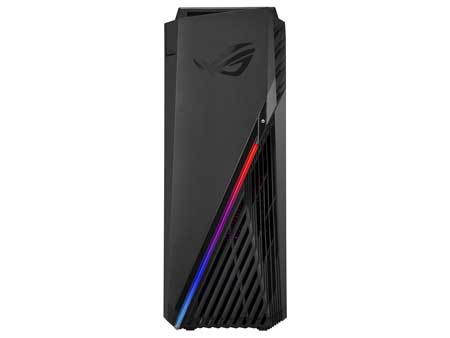 See This On Amazon |
|
| CPU | AMD Ryzen 7 3800X |
| Processor Speed | 4.5 GHz |
| GPU | GeForce RTX 2070 SUPER |
| Graphics Card Memory | 16 GB |
| RAM | 16GB DDR4 |
| Storage Space | 512GB PCIe SSD + 1TB HDD |
| Operating System | Windows 11 |
| Dimensions | 42.1 x 7.3 x 19.6 inches |
| Keyboard & Mouse | Sold Separately |
| Computer Monitor | Sold Separately |
| Advantages | Design, Quality build, value for money |
| Disadvantages | None |
Skytech Gaming Azure Gaming PC Desktop – AMD Ryzen 7 7700X 4.5 GHz, NVIDIA RTX 4070, 1TB NVME SSD |
|
|---|---|
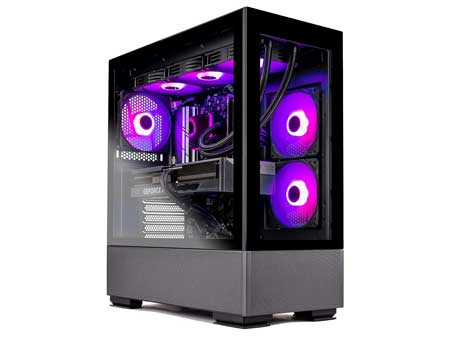 See This On Amazon |
|
| CPU | AMD Ryzen 7 7700X |
| Processor Speed | 4.5 GHz |
| GPU | NVIDIA RTX 4070 |
| Graphics Card Memory | 12 GB |
| RAM | 32GB DDR5 |
| Storage Space | 1TB NVME SSD |
| Operating System | Windows 11 |
| Dimensions | 23.25 x 20.25 x 12.5 inches |
| Keyboard & Mouse | Sold Separately |
| Computer Monitor | Sold Separately |
| Advantages | Value |
| Disadvantages | Storage |
Skytech Gaming Nebula Gaming PC Desktop – Intel Core i5 13400F 2.5 GHz, NVIDIA RTX 4060, 1TB NVME SSD |
|
|---|---|
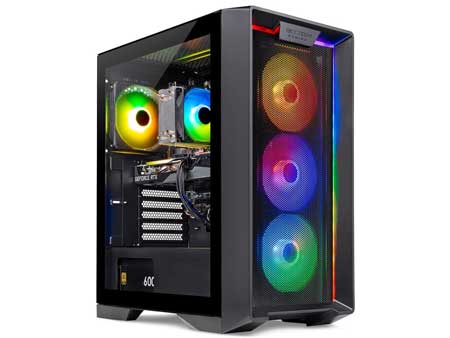 See This On Amazon |
|
| CPU | Intel Core i5 13400F |
| Processor Speed | 2.5 GHz |
| GPU | NVIDIA RTX 4060 |
| Graphics Card Memory | 8 GB |
| RAM | 16GB DDR4 |
| Storage Space | 1TB NVME SSD |
| Operating System | Windows 11 |
| Dimensions | 22.5 x 20.5 x 13.5 inches |
| Keyboard & Mouse | Sold Separately |
| Computer Monitor | Sold Separately |
| Advantages | Design and Build |
| Disadvantages | Storage |
RELATED ARTICLES


